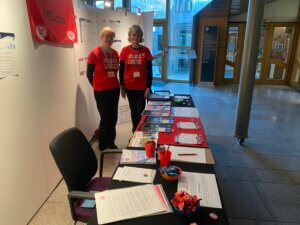#MEAction is thrilled to announce that we are supporting the work of two research assistants working on myalgic encephalomyelitis (ME) for one year as part of our inaugural #MEAction Young Researcher Fellowship. The goal of the fellowship is to grow the field by supporting aspiring research scientists early in their careers and connecting them with a lab working on ME.
This year, Paula Lara Mejia and Sydney Brumfield will each receive $5,000 to help support their work with neuroscientist Michael VanElzakker, a researcher at Harvard Medical School. VanElzakker’s work focuses on neuroinflammation in ME. His theory is that ME is caused by an infection in or around the vagus nerve, which is the longest nerve in the autonomic nervous system.
VanElzakker is using a combined MRI and PET scan to look for increased cellular activity in a part of the brain stem that is a hub for vagus nerve fibers. His lab is looking to see if there is more activity in that region in people with ME than in healthy controls, meaning that an exaggerated signal is coming from the vagus nerve into the brain of people with ME.
VanElzakker and his research assistants meet weekly to discuss articles in the field, their research, and then coordinate with #MEAction on how their learnings can support the growing list of ME resources available to patients, doctors, researchers and allies via our MEpedia project, which is a crowd-sourced website about the history, science and medicine of ME and CFS.
#MEAction sat down to interview Paula Lara Mejia and Sydney Brumfield to learn more about their backgrounds, work, and how they became interested in researching ME.
Tell us about your background. How does your research interests align with myalgic encephalomyelitis?
Paulita:
I graduated from Princeton University ’18, where I studied Neuroscience with certificates in Global Health & Health Policy and Cognitive Science. I plan to pursue an MD (or an MD/PhD!) after doing research on ME for two years. Last year, I happened upon an online documentary about ME, and immediately became passionate about understanding the social impacts as well as the underlying mechanisms of this disease. A few months later, I was thrilled to attend a screening of Unrest on campus with the opportunity to talk to director and activist Jennifer Brea (Class of ’05). She connected me with Dr. Michael VanElzakker, and, shortly after, I applied to a position to work with him.
Sydney: I’m a recent graduate from Wellesley College with a degree in neuroscience, and a focus in premedical sciences. During our tenure at Wellesley, my best friend became infected with a mono-like illness and was diagnosed with ME about nine months later. She invited me to a screening of Unrest on campus, where I spoke with activists and people currently affected by ME. After seeing the hardships she endures, the struggles of other patients and finding that this disease is egregiously understudied, I hope to put my degree to use to understand ME. I feel fortunate to receive the opportunity to work alongside Dr. VanElzakker as a research fellow for #MEAction.
What is one thing that you have learned so far that has excited or challenged you?
Paulita:
While doing research for MEpedia and through interacting with ME patients in our lab, I have been very interested in how each person has a unique and very complex ME story. On top of that, I find it simultaneously compelling and frustrating that so many systems are involved in this disease. It is fascinating how each person is truly their own case, and that researchers and clinicians really need to approach their investigative work with this in mind to further our understanding of ME.
Sydney:
Something interesting that I’ve learned is how varied the onset of this disease can be. The outcome is largely the same where people experience PEM, fatigue, continual pain, however; bacterial and viral infections are not the only precursors to ME. People report whiplash, surgical procedures or even trauma without infection and have the same symptoms as those who report infection at the onset. This fascinates me and I’d like to understand why this occurs.
What do you hope to contribute to the world of ME?
Paulita:
High quality research! I am currently working on a study that characterizes post-exertional malaise using high-resolution functional magnetic resonance imaging by scanning ME patients and controls before and after an invasive exercise challenge.
Sydney:
I would like to help validate the experience of people with ME by contributing high caliber research. My research focuses on finding a biological marker to look for evidence of neuroinflammation in the brains of ME patients. We have a unique capability of using a dual PET-MR scanner in the center I work, which would provide invaluable connections between structures of the brain and uptake of radiotracers specific to microglia activation (which occurs during neuroinflammation). I’m excited about this opportunity and think it would be useful in progressing ME research.
- You can support Michael VanElzakker’s work by donating to Myalgic Encephalomyelitis (Chronic Fatigue Syndrome) / Exercise Challenge Study
- We’d love to take Unrest to many more universities around the world, inspire more young people to take an interest in the ME/CFS field, and connect them with research opportunities early in their careers. To support that work, donate here.






8 thoughts on “Announcing Launch of the #MEAction Young Researcher Fellowship”
i developed me after being given a live polio vaccine when i was 29 . no one attrbuted it to the vaccine at the time . it was only when i read about the coxackie outbreak in usa that i clicked . it all fell into place . i had severe diahorea then i lost te lining of my bowel enterily like a sausage caseing it depart from my gut . i could not stand up due to muscle weakness and dizzyness . felt like i had the flu but did not . doctor did not now for 1 year hat was going on i used to joke i needed a trlley for my notes i had al sorts of fungal/ bacterial infections. permanent diahhorea and dizzyness i had oesphagitis 3 times . i had like smarty sized redspots all over my throat andeven they came out my bottom permanent thrush haemeragic cystis . and a horrible feelling of unwellness . this a persisted for 8 years . i then got sort of better but if i was ill back came the horrible feeling . . years later in 1992 i had a strange joint issue they swole up and were painful to touch i could not bend my ankles i came down stairs on my bottom . that went after a year . i know have fobromyalgia and early onset arthritis . damage c5 disc with a fall and damage a bit of my spine a facet joint . was then bit in back by horse severely causeing internal bleeding still have alum that swells up and down full of fliud . it also lifted my ribs up brobably severing nerves . so iim know dsabled by all of this . i think there is a link to polio vaccine and me and me to fibro . i just need someone to listen to my tale of woe and tell me if there is a link doctors dont have time and are severely not interested
Hi
Really glad young people are interested in becoming involved in researching ME/CFS. I am interested to know, following the link mentioned with inflammation, whether the role (or the lack of) alpha 1 antitrypsin has on susceptibility to or progress of ME/CFS? Although a total.absenxe if this (Z gene variant) is know to lead to liver and lung disease, this enzyme plays a role in the body as an anti-inflammatory also. I have two sons with CFS, one has the S gene variant of A1AT, meaning a reduced amount of this than the norm (M gene variant) but not a total lack. As its genetic, it’s possible my other son (also CFS, not tested for A1AT as this test is not available on the NHS. I believe treatment for the under diagnosed condition of A1AT disease can also help ME/CFS?
Thank you for your work Paulita and Syndey! My question for you both is how you found neuroscientist Michael VanElzakker and this fellowship?
I am a biology graduate from Columbia University and I was diagnosed with me/cfs 4 years ago. I had to attend school part time and it took nearly two years to fully diagnose and understand. Since then I have gained my life and hope back.!
I recently moved to San Diego and would love to work in research especially for this disease during my two gap years before medical school. As a doctor someday I hope to help patients learn how to cope with this disease but there is still so much work to be done on the research part of things and I would love to partake!
Best,
Sara
Hello, Sara! So glad to hear that you were able to find some measure of better wellness! Contact me at [email protected] and we’ll talk.
If you are at San Diego, hope you might work with professor Naviaux who studies metabolomics for ME/CFS, Autism, ,MS etc
You should research Byron Hyde’s work wrt ME. You used SPECT. He studied what areas in the brain that are effected using SPECT. https://www.goodreads.com/book/show/11085562-missed-diagnoses
Dr Hyde has a done a great deal of excellent work in ME, and his little book on differential diagnosis is really one of the most valuable I’ve ever read.
Thank you for the updates on much needed research. I became ill suddenly with a high fever 22 years ago followed by debilitating neurological symptoms, overwhelming fatigue, brain fog, etc. You’ve heard the stories…bed ridden for 2 1/2 years, 13 doctors and as many diagnosis. It took 3 years to finally be diagnosed with CFS and after reading other’s stories I became comforted that I was not alone. A diagnostic marker will be a god send for so many suffering from this terrible illness. All these years later I’m much better, although take one day at a time, pacing myself with gentle exercise and a nutritious diet. I’m hopeful by this new resurgence of interest for research and a cure. Best wishes to all. Judi in Lutz, Florida
Comments are closed.